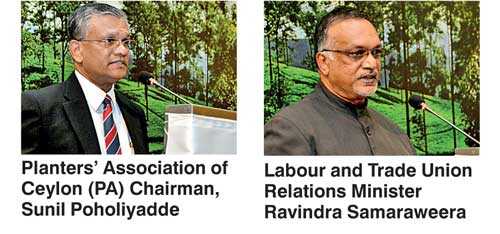Wednesday Feb 25, 2026
Wednesday Feb 25, 2026
Tuesday, 2 October 2018 00:20 - - {{hitsCtrl.values.hits}}
By Charumini de Silva
With the current collective agreement on wages for the plantation workers lapsing this month, the Planters’ Association of Ceylon (PA) insisted that the existing model cannot be sustained long-term, adding that time has come to look at a different model based on productivity and a share of revenue.
“We are glad that the unions agreed for a productivity-based wage structure at the last revision and also to look into a revenue share model, which needs to be aggressively pursued for the sustainability of the industry,” PA Chairman Sunil Poholiyadde said, addressing the 164th Annual General Meeting of the Association last Friday.
With the assistance of the Employers’ Federation of Ceylon and EFC Plantation Group, he expects that they would reach an agreement before the due date.
The Chief Guest of the event, Labour Minister Ravindra Samaraweera also said that he hoped PA will be able to conclude negotiations early and pass on the best possible benefits to the workers, while also ensuring that mechanisms are in place to provide higher productivity and efficiency in the estates.
The Minister also encouraged stakeholders to look at new and innovative models of planting, harvesting and sharing revenue.
“Your industry has always upheld tripartite values and has done much to engage with trade unions who represent workers. The collective agreement itself is a monument to the cooperation that the RPCs have extended to the worker trade unions to improve their standards and promote social dialogue even at the grass root level,” he added.
As the industry faces challenges of the fourth industrial revolution, Samaraweera urged the RPCs to take advantage of the opportunities that would come their way in the form of automation and digitalisation as well as make them use those technologies to improve productivity and take the sector to greater heights.
“Whilst the greatest source of ensuring quality is the linking of two leaves and a bud, we will not be able to do away with the human element. Mechanised and automation-related solutions may have to be thought of to face realities like dearth of labour. I am mindful that technology could be made use of as a strategy to retain labour for improving your operations as well,” the Minister emphasised.